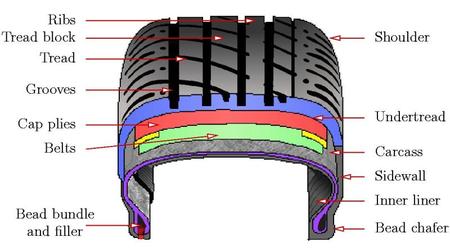Tyre buying guide
Read our overview of vehicle tyres to better understand which tyres to buy.
The proper set of tyres for a car helps to improve road performance, provide better safety, comfortable handling, and an ability to respond well to different road conditions.

Tyres can be searched for based on their size, their make and model of the owner’s vehicle, the tyre manufacturer, or the licence plate.
When choosing tyre(s), there are tyre related factors and car related factors that impact the decision of which car tyres or other types of tyres to purchase.
Tyre related factors include:
- Size.
- Speed rating.
- Tread pattern.
- Wet and dry performance in varied weather.
- Durability.
Car related factors include:
- The car (each vehicle has a recommended tyre size).
- How the vehicle will be used (motorways or urban roads).
- Frequency of vehicle use.
- The type of weather experienced like the wind, rain, hail, snow and ice.
Let’s now delve a little deeper into what you need to know to choose a good tyre for your vehicle.
Tyre Size
While the Wikipedia definition of a tyre says that the tyre covers the wheel and is essentially there to manage shocks, is technically accurate, it’s a little vague. We would say that the tyre size is a close match to the wheel size because it must fit around the wheels correctly without any overlap. The owner’s manual can confirm the correct tyre size for the wheels mounted on the vehicle when it came out of the factory.
Tyre sizes themselves are a bit odd. They will be noted on the sidewall of each tyre and may look something like this: 175-65 R14T. This refers to the width, profile of the sidewall, tyre (radial), wheel rim diameter, and the speed rating. Take a look at the Bridgestone website that has an excellent diagram explaining this visually.
With the speed rating, this refers to the maximum allowable speed with a certain tyre. Various letters are used to signify different speed ratings. Most people living in the city don’t go very fast, but people who regularly take long trips using the motorway may find that they need tyres with a higher speed rating. Bear in mind that it is not safe to use tyres with a low-speed rating at faster than the maximum recommended speed even once because it risks a tyre blowout. Therefore, it is better to buy a tyre that is what you expect to need for speed under all circumstances to avoid having a problem later.
Low profile tyres are also available. However, they offer much less shock absorption, so potholes and other sudden changes in road height will be felt more by the driver and their passengers. Country roads are better with a regular tyre profile, but motorways and regular roads may be okay with a low profile tyre.
Tyre Tread
The tyre tread is the groove or indented pattern that is visible on the exterior of the tyre that will connect with the road when driving. The tread has a material affect on the braking responsiveness, road grip, vehicle handling with deteriorating weather, durable, and the noise generated by the tyres in the local neighbourhood when driving through it.
The tread on each tyre wears down the more it is used. Tyres much have at least 1.6mm of tread left across three-quarters of the tyre’s surface to remain legal to use. However, Tyre Shopper recommends a 3mm limit before replacing a tyre to ensure control is not impacted negatively. Car tyres have markings inside the tread which will be visible when reaching 1.6mm; drivers should inspect their vehicle for this on a regular basis.
Tread patterns vary from tyre to tyre, manufacturer to manufacturer. There are different tyre types with various treads that have been found in testing to perform better.
The durability of a tyre is also critical. There are budget tyres, but these sometimes may wear down faster and the cost of owning one could be higher over the life of the vehicle when repeatedly using budget tyres. With budget tyres, one has to be more vigilant of the remaining tyre tread as it can go down much faster.
Tyre Type
Car tyres come in different categories which relate to their purpose and suitability in various driving situations.
Performance Tyres
Performance tyres are intended for sports cars where speed and road grip are the priority. These tyres wear down faster.
All Weather Tyres
All weather or regular car tyres are the types that most vehicles (other than sports cars and individual trucks) are fitted with when purchasing a new vehicle. The tyre is designed to manage moderate weather and changing road conditions during the spring, summer, autumn, and winter. The braking, grip, durability and noise emissions are middling, usually not going to any extreme either way.
Wet, Mud, Snow & Ice Tyres
Other tyres have special treads, which dispel water collecting inside the tread.
The rubber compound used is softer and more able to stay flexible during cold nights in the middle of winter which regular tyres are not perfectly equipped to do.
Regarding budget, it is possible to search for and find a collection of suitable tyres for your vehicle that combine good handling, fuel efficiency, an ability to handle the elements, and to last without the tread wearing out too quickly.
Tyre Shopper is only too happy to assist you in the search for the perfect tyre for your vehicle. Please call us on 0800 731 0133 for assistance or use our contact form.
Find your local FITTING centre or MOBILE fitting service
